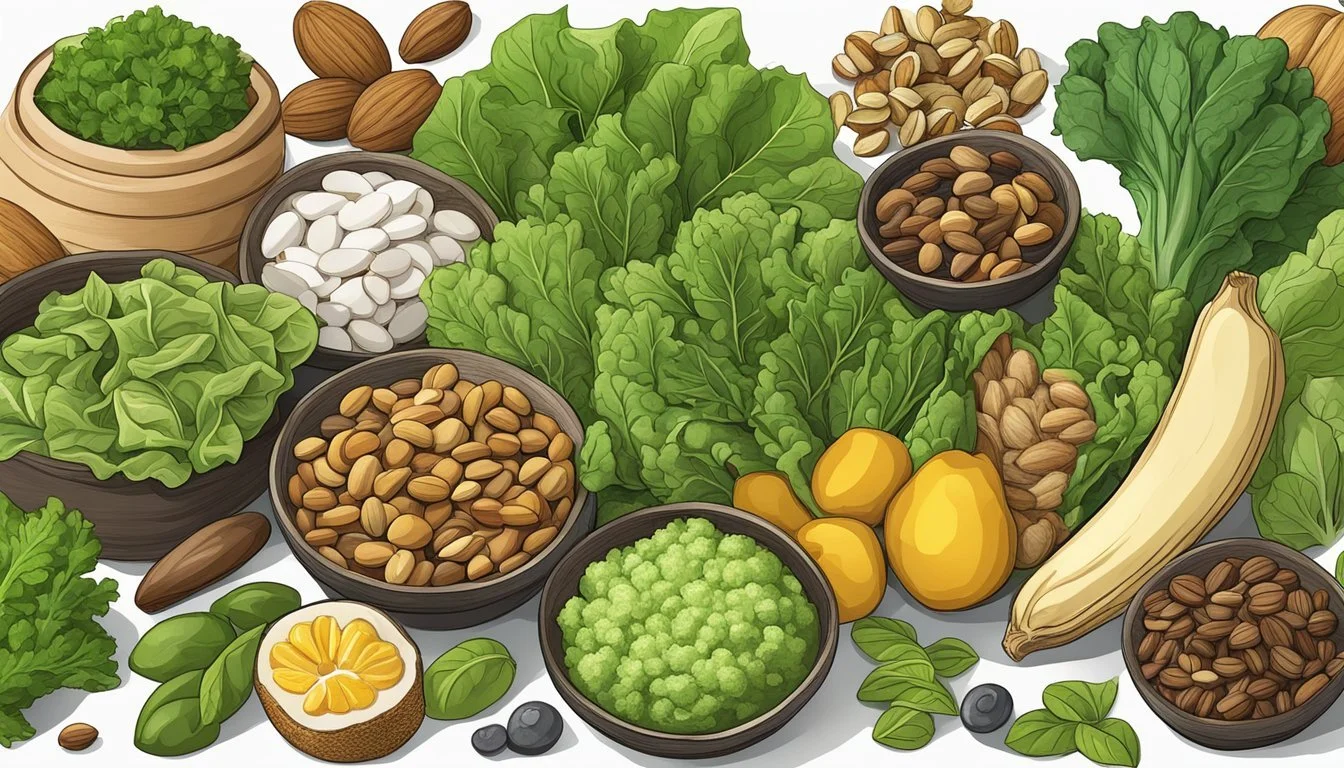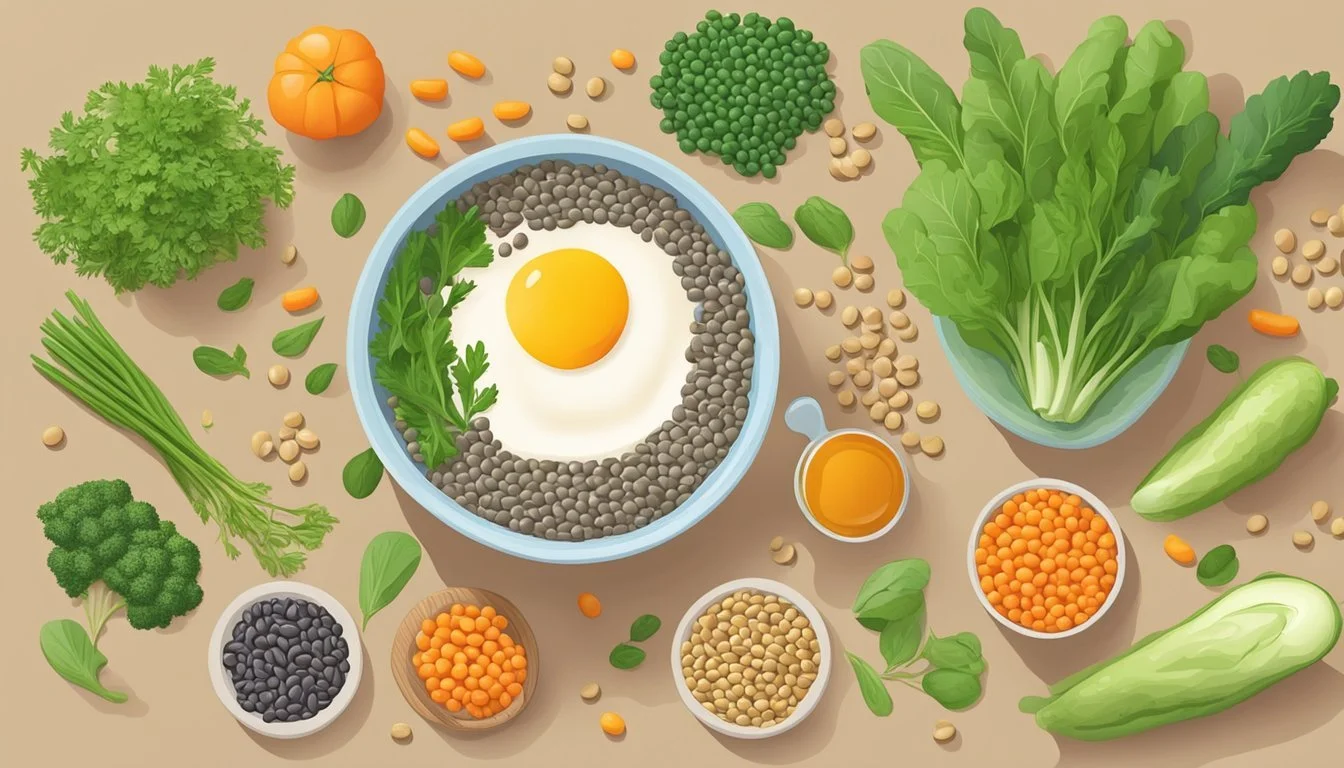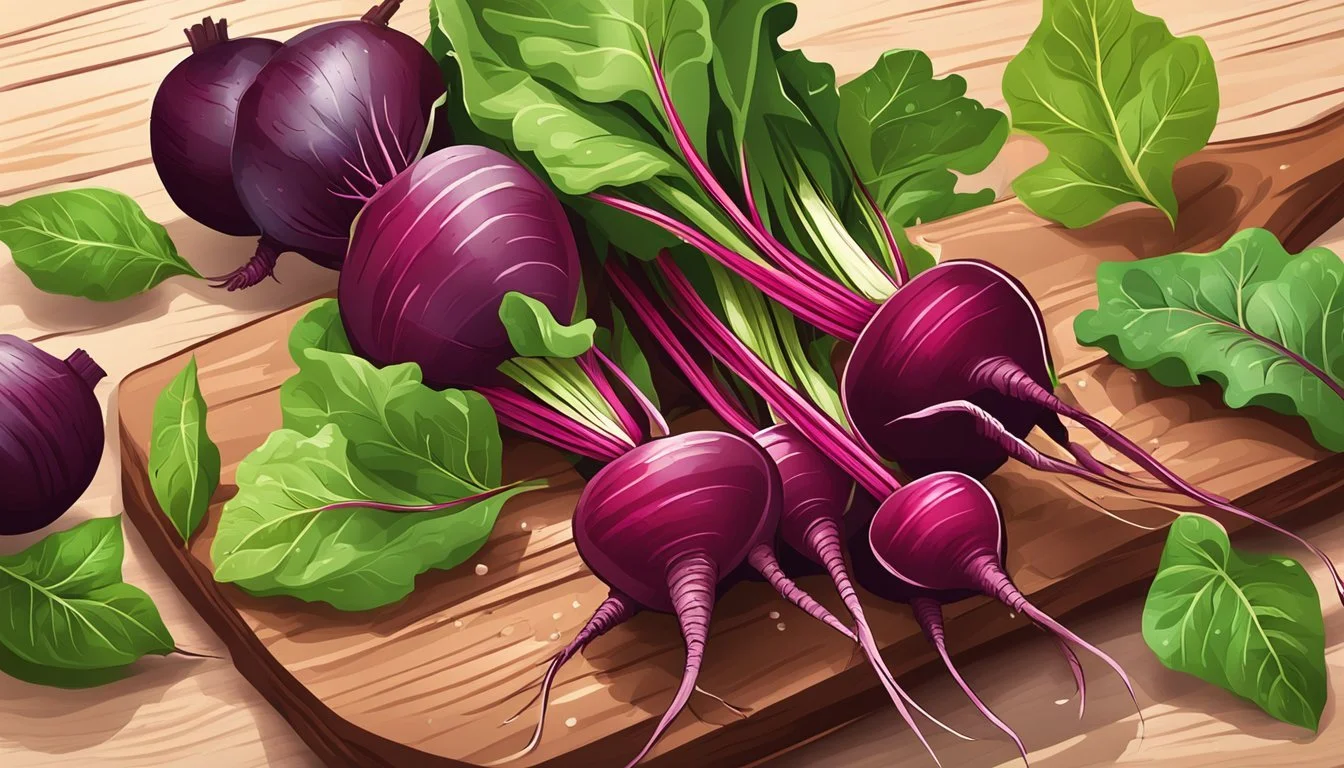Foods High in Vitamin B9 (Folate)
Boost Your Health and Wellbeing
Vitamin B9, also known as folate or folic acid, is a crucial nutrient that plays a significant role in numerous bodily functions. It is essential for DNA synthesis and repair, which means it is vital for cell division and growth. The body cannot produce this vitamin on its own, so it must be obtained through diet.
Incorporating foods rich in Vitamin B9 into daily meals is essential for maintaining optimal health. With a variety of options like legumes, leafy greens, fruits, and fortified grains, it's simple to meet the recommended daily intake. Regular consumption of these foods supports overall health and well-being.
1) Spinach
Spinach is a leafy green vegetable renowned for its high nutritional value. Among its many benefits, spinach is exceptionally rich in vitamin B9, also known as folate. One cup of raw spinach contains approximately 58 micrograms of folate, making it a valuable addition to a folate-rich diet.
This versatile vegetable can be consumed in various forms. It can be enjoyed raw in salads, lightly sautéed, or even blended into smoothies. Spinach not only enhances the flavor of dishes but also boosts their nutritional profile.
Additionally, spinach is low in calories and packed with other essential nutrients. It is a good source of vitamins A, C, and K and also contains iron, calcium, and antioxidants. This makes it a multifunctional food that supports overall health.
Regular incorporation of spinach into meals is an easy way to help meet daily folate requirements. Its accessibility and adaptability to different culinary applications make it a practical choice for anyone looking to increase their intake of vitamin B9.
2) Asparagus
Asparagus is a highly nutritious vegetable that serves as an excellent source of vitamin B9, also known as folate. Just half a cup (90 grams) of cooked asparagus provides a substantial amount of this essential vitamin.
In addition to folate, asparagus is low in calories, making it a healthy addition to any diet. It contains about 20 calories, 2.2 grams of protein, and minimal fat per half-cup serving.
Asparagus also boasts other essential nutrients, including vitamin K, vitamin A, and zinc. This vegetable's nutrient profile contributes to various health benefits, supporting bone health, immune function, and overall well-being.
Incorporating asparagus into meals can be simple. It can be steamed, roasted, or added to soups and salads. Its versatility and nutritional benefits make it a valuable addition to a balanced diet.
3) Lentils
Lentils are a powerhouse when it comes to folate, also known as vitamin B9. A single cup of cooked lentils can provide about 90% of the daily recommended intake of folate.
These legumes are versatile and can be incorporated into a wide range of dishes, from soups to salads. They also offer additional nutritional benefits, including high levels of protein and fiber.
Lentils come in various types such as brown, green, and red, all of which are rich in folate. Including lentils in your diet not only supports overall health but also helps in preventing folate deficiency.
Cooking lentils is straightforward and quick, making them a convenient dietary addition. They're not only nutrient-dense but also affordable and accessible.
4) Black-eyed Peas
Black-eyed peas are an excellent source of vitamin B9 (folate). One cup of cooked black-eyed peas provides about 375 micrograms of folate, which meets nearly all of an adult's daily requirement.
In addition to folate, black-eyed peas are rich in fiber and protein. A single cup contains approximately 11.1 grams of fiber and 13.2 grams of protein.
These legumes also offer a variety of other essential nutrients, including iron, magnesium, and potassium. This nutrient profile makes black-eyed peas a healthy addition to any diet.
Incorporating black-eyed peas into meals is simple. They can be eaten on their own, added to soups, salads, or stews, and even used in dips.
Overall, black-eyed peas are a nutritious option for those looking to boost their folate intake and enjoy a variety of other health benefits.
5) Brussels Sprouts
Brussels sprouts are a potent source of vitamin B9, also known as folate. A half-cup serving of cooked Brussels sprouts provides about 47 micrograms of folate, contributing significantly to the daily recommended value.
This vegetable is also rich in other essential nutrients. It contains high amounts of fiber, vitamin C, and vitamin K.
Pregnant women may particularly benefit from consuming Brussels sprouts due to their high folate content. Folate is vital for fetal brain development in the first trimester. Including Brussels sprouts in the diet can help meet the increased demand for this important vitamin during pregnancy.
Aside from folate, Brussels sprouts also offer a range of other health benefits. They are low in calories and have a good amount of protein and healthy carbohydrates. This makes them a versatile addition to various meals, whether steamed, roasted, or boiled.
6) Avocado
Avocado stands out as a rich source of Vitamin B9, commonly known as folate. Just one cup of sliced avocado provides a significant amount of the daily recommended intake.
In addition to folate, avocados are packed with healthy fats, particularly monounsaturated fats, which support heart health. These fats can help lower bad cholesterol levels.
Avocados also offer a variety of vitamins and minerals, including potassium, vitamins K, E, and C. Their creamy texture makes them versatile for various dishes, from salads to smoothies.
Including avocado in the diet can aid in meeting folate needs while providing a range of other health benefits.
7) Beets
Beets, also known as beetroot, are a highly nutritious vegetable. They are particularly rich in folate, a form of vitamin B9. Folate plays a crucial role in DNA synthesis and repair, making it essential for cell division and growth.
In addition to folate, beets contain other important nutrients. These include fiber, manganese, potassium, iron, and vitamin C. The combination of these nutrients helps support overall health and well-being.
Beets can be consumed in various ways, such as raw, cooked, or in juice form. Including beets in your diet can enhance your intake of folate and other essential vitamins and minerals. This makes them an excellent choice for those looking to boost their nutritional intake.
8) Oranges
Oranges are not only famous for their vitamin C content but are also a good source of vitamin B9, also known as folate.
One small fresh orange provides a notable amount of folate, making it a beneficial addition to your diet.
In addition to being eaten fresh, oranges can be enjoyed in many forms, including as juice or added to salads.
Oranges contribute essential nutrients and are easy to integrate into daily meals. This makes them a convenient option for increasing one's intake of vitamin B9.
The water-soluble nature of folate in oranges means it plays a key role in various bodily functions, such as DNA synthesis and repair.
By including oranges in your diet, you not only gain the benefits of vitamin C but also ensure an intake of the crucial vitamin B9.
9) Broccoli
Broccoli is a cruciferous vegetable known for its high vitamin B9 content, also referred to as folate. A half-cup serving of cooked broccoli provides 52 micrograms of folate.
In addition to folate, broccoli is packed with other essential vitamins and minerals such as vitamin C, vitamin K, and vitamin A.
Including broccoli in meals can enhance overall nutritional intake. It can be steamed, roasted, or even eaten raw in salads, making it a versatile addition to your diet.
Regular consumption of broccoli can help meet the daily recommended intake of folate, which is crucial for DNA synthesis and repair. Folate is especially important during periods of rapid growth, such as pregnancy.
Broccoli's rich nutrient profile not only supports folate intake but also contributes to general health and well-being, making it an excellent choice for those looking to boost their vitamin B9 levels.
10) Sunflower Seeds
Sunflower seeds are a nutritious snack packed with essential nutrients, including Vitamin B9 (folate). A single ounce of dry roasted sunflower seeds provides about 67.3 micrograms of folate, which is approximately 17% of the recommended daily value.
These seeds are also rich in healthy fats, proteins, and fiber, making them an excellent addition to various diets. Including sunflower seeds in daily meals can contribute to better overall nutrition.
Folate plays a crucial role in DNA synthesis and repair, making sunflower seeds particularly beneficial for pregnant women. Adequate intake of folate helps prevent neural tube defects in developing fetuses.
Incorporating sunflower seeds into salads, yogurt, or as a standalone snack is an easy and tasty way to boost folate intake. They also offer other essential nutrients like vitamin B6, vitamin E, and magnesium.
Sunflower seeds are versatile and can be enjoyed in different forms, such as raw, roasted, or added as a crunchy topping to dishes.
Health Benefits of Vitamin B9
Vitamin B9, also known as folate or folic acid (when in supplement form), provides essential support for various bodily functions. It plays a crucial role in cell division and growth, and has a significant impact on heart health.
Role in Cell Division and Growth
Folate is vital for DNA synthesis and repair. It helps in the formation of red blood cells and is particularly important during periods of rapid growth, such as pregnancy and infancy.
A deficiency in vitamin B9 can lead to complications like megaloblastic anemia, where red blood cells are larger than normal and not as effective in oxygen transport. For pregnant women, adequate folate intake is critical in preventing neural tube defects in the developing fetus.
This nutrient also supports healthy hair, skin, and nails due to its role in cellular production and repair.
Impact on Heart Health
Vitamin B9 helps regulate levels of homocysteine, an amino acid in the blood. Elevated homocysteine levels are associated with an increased risk of cardiovascular diseases, including heart attacks and strokes.
By aiding in the breakdown of homocysteine, folate contributes to the reduction of these risks. People with higher folate intake tend to have lower instances of hypertension and other heart-related issues.
Adequate folate levels can also support healthy blood vessels, further protecting against cardiovascular conditions. This makes vitamin B9 a key player in maintaining overall cardiovascular health.
Recommended Dietary Allowances
The Recommended Dietary Allowance (RDA) for vitamin B9, also known as folate or folic acid, varies based on age and physiological conditions like pregnancy. It's essential to meet these requirements for optimal growth, development, and overall health.
Daily Intake for Different Age Groups
Infants (0-6 months) require 65 mcg of folate daily, while infants (7-12 months) need 80 mcg.
Children aged 1-3 years should consume 150 mcg daily. Children aged 4-8 years need 200 mcg. For those aged 9-13 years, the requirement rises to 300 mcg.
Adolescents aged 14-18 years and adults need 400 mcg daily.
These amounts ensure that different age groups get adequate folate to support cellular functions and prevent deficiencies.
Special Requirements During Pregnancy
Pregnancy significantly increases the need for folate. Pregnant women are advised to consume 600 mcg daily.
This increased amount is crucial for preventing neural tube defects in the developing fetus.
Lactating women require 500 mcg daily to support milk production and replenishment of maternal stores.
Meeting these elevated requirements is critical for maternal and fetal health, emphasizing the importance of adequate dietary intake and supplements when necessary.
Effects of Vitamin B9 Deficiency
Vitamin B9 deficiency can lead to various health issues, both short-term and long-term. It is crucial for processes such as red blood cell formation and DNA synthesis.
Common Deficiency Symptoms
A lack of vitamin B9, or folate, often manifests in symptoms such as fatigue and weakness. Individuals may feel constantly tired and unable to carry out daily activities efficiently.
Mouth sores and swollen tongue are also common. These symptoms can make eating and speaking uncomfortable.
Neurological symptoms like irritability, memory issues, and even depression can occur. These symptoms arise because folate is essential for proper brain function and mood regulation.
Long-Term Health Risks
Long-term vitamin B9 deficiency can cause serious health complications. It may lead to anemia, where the number of red blood cells is insufficient, causing extreme fatigue and weakness.
Pregnant individuals with low folate levels are at risk of having babies with neural tube defects. This includes conditions like spina bifida, which affects the spine and brain.
Chronic deficiency can potentially result in cognitive decline and cardiovascular problems. Inadequate folate levels have been linked to homocysteine buildup, which is associated with heart disease.
Ensuring sufficient intake of vitamin B9 through diet or supplements is crucial to prevent these health risks.







